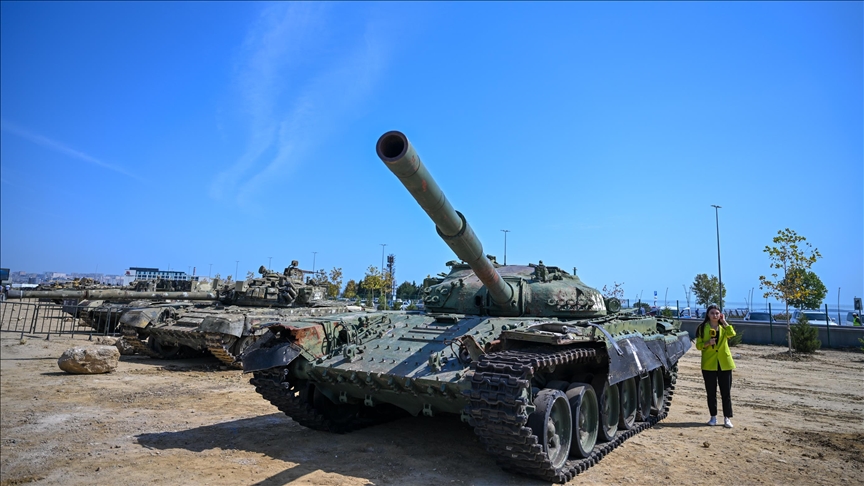Azerbaijan seeks justice at international courts for Armenian crimes in Karabakh
In legal showdown, Baku tries to hold Yerevan accountable for offenses during 3-decade occupation of Karabakh
 Tank, located on the Shusha - Stepanakert road which Armenians used as a "victory monument" related to the 1st Karabakh War during the occupation period, is seen as it is brought to Baku, Azerbaijan on September 23, 2023
Tank, located on the Shusha - Stepanakert road which Armenians used as a "victory monument" related to the 1st Karabakh War during the occupation period, is seen as it is brought to Baku, Azerbaijan on September 23, 2023
THE HAGUE
Taking the country to multiple international courts, Azerbaijan is working to hold Armenia accountable for its crimes during the nearly three-decade occupation of Karabakh, a top Azerbaijani diplomat told Anadolu.
Azerbaijan is weighing up its options to address any rights violations and crimes committed by Yerevan during its occupation of the southern Caucasus region dating back to 1991, said Deputy Foreign Minister Elnur Mammadov.
His comments come as a hearing on Armenian objections to the International Court of Justice’s (ICJ) jurisdiction over a 2023 Azerbaijan lawsuit began at the Hague on Wednesday.
Mammadov detailed the process and Azerbaijan's expectations at the ICJ, where Armenia is facing a trial for violating the International Convention on the Elimination of All Forms of Racial Discrimination.
After the Second Karabakh War of fall 2020, in which much of Karabakh was liberated from occupation, Azerbaijan initiated several cases in international courts due to Armenia's responsibility for various crimes in Karabakh, land internationally recognized as Azerbaijani land, he said.
“One of these cases is a lawsuit filed against Armenia at the ICJ in September 2021, under the 1965 International Convention on the Elimination of All Forms of Racial Discrimination," he added.
Armenia accused of ethnic cleansing
Mammadov said Armenia already made its initial objections to the court on the trial.
"Azerbaijan will respond to these objections. Later, the second round of presentations will take place. First Armenia and then Azerbaijan will present their responses to the court," he said.
Accusing Yerevan of genocide and ethnic cleansing in occupied territories, the Azerbaijani diplomat said: "Armenia had plans to ensure Azerbaijanis would not live in these territories ever again."
He said he hoped that through the case, Armenia's rights violations would be recognized at the ICJ which would ensure that Armenia fulfills its obligations related to the return of Azerbaijanis to Karabakh.
Several programs to rehabilitate Azerbaijanis expelled from the territory are already underway, he added.
Compensation, return to Karabakh
Azerbaijan is also demanding compensation from Armenia for its rights violations, after the ICJ decided it had jurisdiction over the case, thus the court would consider Baku's demands.
Mammadov said they also informed the judges at the European Court of Human Rights (ECHR) about Armenian-laid landmines that were part of its ethnic cleansing policy against Azerbaijanis.
"The court will evaluate the uncleared mines after this week's presentations."
"Our assessment shows Armenia used various methods of racial discrimination against Azerbaijanis. One of these was laying mines to prevent Azerbaijanis from returning," he said.
The Azerbaijani diplomat said these mines killed or injured at least 352 Azerbaijanis and that they would present evidence of this at the ICJ during this week's hearings, as they did in previous hearings.
"Armenia initially claimed not to have maps showing the locations of these mines in these territories. Later, as a result of international pressure, it admitted to having them,” he said.
"They provided these maps in fragments over the last three years. They have an accuracy rate of about 25%, which is insignificant. This is also an indication of the hatred toward Azerbaijanis," said Mammadov.
“Armenia has been uncooperative with demining and did not fulfill its international obligations. We have no choice but to take these issues to international courts,” he added.
Azerbaijan's justifications
Relations between Baku and Yerevan have remained tense since 1991, when the Armenian military occupied Nagorno-Karabakh, a territory internationally recognized as part of Azerbaijan, and seven adjacent regions.
Azerbaijan accuses Armenia of violating the International Convention on the Elimination of All Forms of Racial Discrimination by carrying out ethnic cleansing, destroying culture, environmental attacks, hate speech, and disinformation.
Azerbaijan alleges that Armenia carried out "ethnic cleansing" based on "national and ethnic origin" from 1987 to 2020 in the previously occupied territories and in Armenia, to engineer a state in Karabakh consisting only of Armenians.
Baku also claims that all Armenian authorities, from the highest levels of government, engaged in racist and hate speech.
According to its official accounts, Armenia expelled approximately 1 million Azerbaijanis living in the occupied territories, destroying cities, towns, and cultural heritage.
Azerbaijan demands that the ICJ find Armenia in violation of several articles of the Racial Discrimination Convention and that Armenia cease all ethnic cleansing policies and practices against Azerbaijanis immediately.
They also demand that Armenia be held accountable for the damage caused to Azerbaijan and pay compensation.
Lawsuits between the 2 countries
Most of the Armenian-occupied territory was liberated by Azerbaijan during a war in the fall of 2020, which ended after a Russian-brokered peace agreement that also opened the door to normalization.
Azerbaijan established full sovereignty in Karabakh after an "anti-terrorist operation" in September 2023, after which separatist forces in the region surrendered.
However, both countries have filed similar lawsuits against each other since.
On Sept. 16, 2021, Armenia filed a lawsuit against Azerbaijan at the ICJ, claiming that Azerbaijan violated the International Convention on the Elimination of All Forms of Racial Discrimination.
Armenia's allegations against Azerbaijan cover the 44-day "Patriotic War," as Azerbaijan calls it, the Second Karabakh War, and the events that followed, in fall 2020.
On April 21, 2023, Armenia filed preliminary objections to the ICJ's jurisdiction in the case Azerbaijan brought against it. The hearings on these objections, which started on Wednesday, is set to end Friday.







